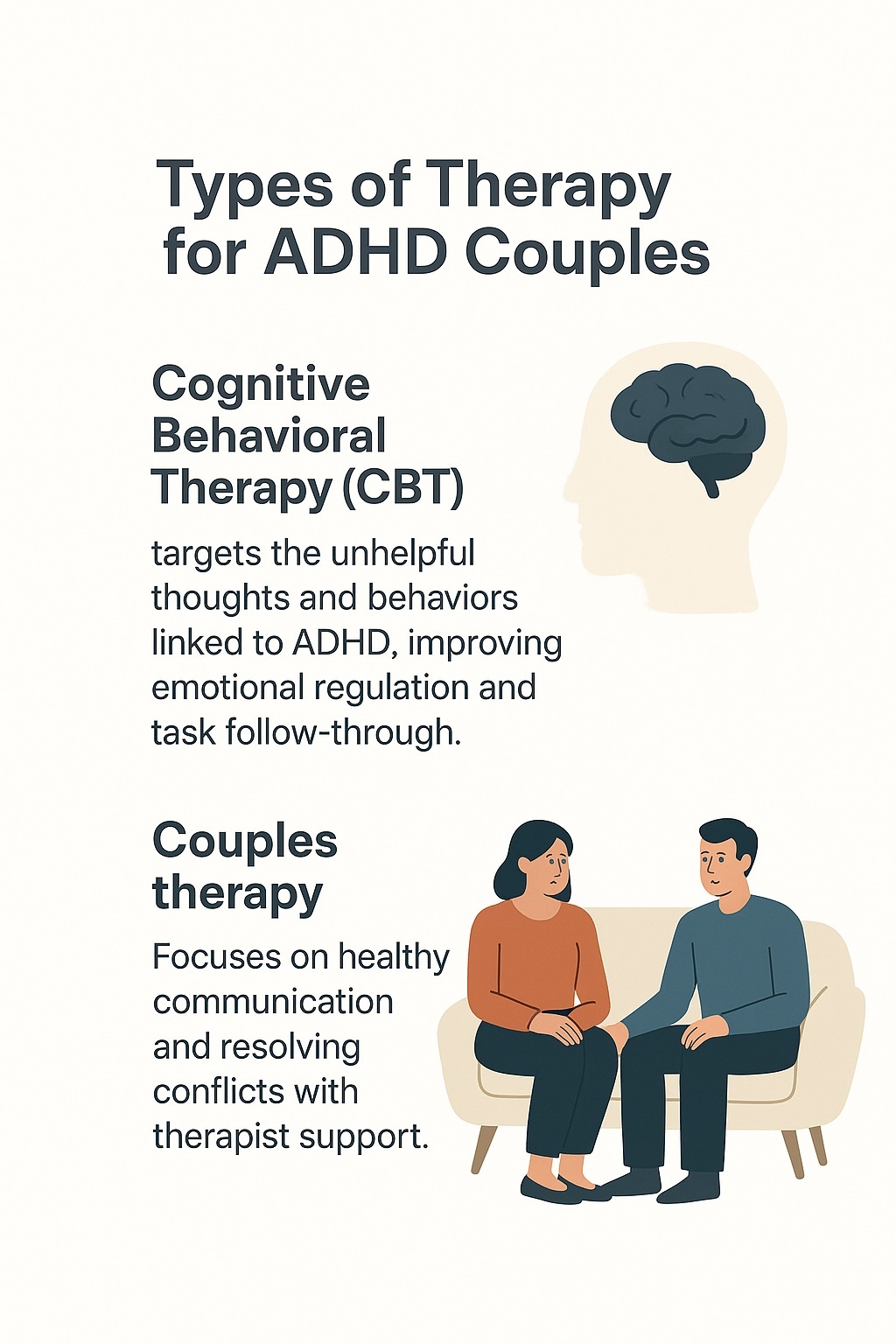The ADHD Effect on Marriage: What Are 10 Common Struggles?
Key Highlights
- The ADHD effect on marriage is real about 38% of individuals with ADHD report that their marriage nearly ended in divorce.
- Symptoms like distractibility, forgetfulness, and impulsivity can strain communication and emotional connection.
- Signs of inattention or forgetfulness are often mistaken for a lack of love or concern, damaging trust over time.
- Understanding how the ADHD effect on marriage shapes behavior helps both partners respond with patience instead of blame.
- Total Life Counseling provides couples with practical tools to rediscover trust, rebuild balance, and reconnect with each other on a deeper level.
When ADHD enters a marriage, one partner often feels overburdened while the other feels constantly criticized, a cycle that can quietly erode love over time. If your partner has ADHD, you might feel invisible, carrying the weight of the relationship alone. If you’re the one with ADHD, you might feel constantly criticized, no matter how hard you try.
But here’s the truth: ADHD doesn’t have to be the villain in your marriage. When you understand how ADHD affects your daily life, you gain clarity and compassion for each other.
In this blog, you’ll discover 10 more hidden ways ADHD strains relationships, and how you can turn everyday struggles into meaningful opportunities for growth and deeper connection.
What Makes ADHD Relationships So Challenging?
Loving someone with Attention Deficit Hyperactivity Disorder (ADHD), or living with it yourself, can be both beautiful and difficult. ADHD isn’t a flaw or a lack of effort; it’s a neurodevelopmental condition that affects how the brain manages attention, emotions, and organization. While it’s often first noticed in childhood, it usually continues into adulthood in quieter, more subtle ways.
In relationships, ADHD doesn’t just impact one person; it affects both. Forgetfulness, impulsive decisions, emotional outbursts, or constant distraction can make one partner feel unseen or unimportant. Meanwhile, the person with ADHD often feels misunderstood or criticized for things they never intended to do wrong.
If this sounds familiar, please know you’re not alone. Research from the National Institutes of Health shows that over 6% of adults in the U.S. have ADHD, meaning millions of couples face these same struggles every day. The good news is that awareness changes everything. When you begin to understand how ADHD affects your relationship, you can move from blame and frustration toward compassion, teamwork, and healing.
What are 10 Reasons ADHD Leads to Relationship Breakdowns or Divorce?
ADHD doesn’t destroy relationships; misunderstanding does. When symptoms go unmanaged, couples often get caught in painful cycles that leave both partners feeling unseen, unheard, and unloved. But when you finally recognize that ADHD might be the root of your struggles, it can shift everything. Here are ten ways ADHD can quietly strain a relationship, and how awareness can open the door to healing.
1. The Loss of Hyperfocus After Dating
In the early days, your ADHD partner may have made you feel like the center of their world, texting constantly, planning surprises, hanging on every word. But once that intense hyperfocus fades, you might feel like you suddenly disappeared. It’s heartbreaking, especially when it feels personal.
The truth? It’s not a lack of love. It’s a shift in how the ADHD brain manages focus. Rebuilding connection means creating new ways to stay engaged, shared routines, regular check-ins, and even small moments of undivided attention that say, “You still matter.”
2. Constant Distraction
You’re talking about your day, and halfway through, your partner picks up their phone or zones out. You feel invisible. They feel terrible, but can’t seem to help it. ADHD makes attention inconsistent, not affection.
Try saying, “I need your full attention for a few minutes” rather than, “You never listen.” That one small shift helps your partner tune in with awareness instead of shame.
3. Impulsive Words and Reactions
Ever had your partner blurt out something thoughtless, only to regret it seconds later? ADHD impulsivity can make words slip before they’re filtered. Those moments sting and often lead to defensive arguments.
The goal isn’t perfection, but pause. Practicing a breath before reacting, or even using a “time-out” word, can prevent an impulsive moment from becoming a lasting wound.
4. Forgotten Promises
You asked them to pick up groceries. They agreed… and completely forgot. You feel dismissed, even though they meant well. For the ADHD brain, memory gaps aren’t carelessness; they’re wiring.
Visual cues, shared reminders, or phone alerts can save more than just errands; they protect trust. Try tackling the problem together instead of making it personal: “How can we make this easier to remember next time?”
5. Emotional Outbursts
Some days, it feels like you’re walking on eggshells, never knowing what might trigger anger or tears. Emotional regulation is tough for people with ADHD, and reactions can come out bigger than intended. It’s not fair to either partner.
Creating a “pause and name it” practice helps: “I’m feeling overwhelmed, can we talk in a few minutes?” gives emotions room to cool and compassion space to grow.
6. Unequal Responsibilities
You might find yourself juggling the bills, the chores, the schedules, and resentment builds quietly over time. You didn’t sign up to be the manager of everything.
But your ADHD partner often feels terrible about falling short. Instead of saying, “You never help,” try, “Can we split this in a way that works better for both of us?” When both partners take ownership, even imperfectly, balance slowly returns.
7. Financial Disorganization
Missed due dates. Impulsive buys. A shared account that never quite balances. Money fights are brutal, and with ADHD, they can spiral fast.
Instead of arguing over mistakes, try creating systems, automatic payments, shared budgeting apps, or separate spending allowances. This reduces pressure and removes shame. Remember, financial teamwork builds emotional safety too.
8. Poor Time Management
You’re dressed and ready to go, but your partner’s still looking for their keys. Again. It’s frustrating, especially when you feel like you’re the only one keeping things on track.
But lateness and disorganization aren’t about respect; they’re about executive function. Try setting shared alarms or having a “leaving checklist.” It’s not babying, it’s supporting. And over time, you’ll both feel more like teammates than opponents.
9. The Blame Cycle
“Everything falls on me.” “You’re always angry.” Sound familiar? This cycle is exhausting, and no one wins. ADHD creates real misunderstandings that fuel resentment on both sides.
Breaking it starts with empathy: “I know this is hard for you too.” Once both partners drop their defenses, solutions start to appear. It’s not about being right, it’s about being connected.
10. The Parent-Child Dynamic
This one hurts the most. You start feeling like the responsible “parent,” and your partner feels like the “child” who can’t get it right. It kills attraction, equality, and trust. But this pattern can change.
The ADHD partner can rebuild reliability through treatment and structure, while the non-ADHD partner can step back from control. When both share responsibility, the relationship shifts from caretaking back to companionship, where love feels lighter again.
When you understand that these struggles aren’t character flaws but symptoms, the resentment begins to fade. ADHD doesn’t have to define your love story, it can be the reason you both learn to grow closer, with grace, humor, and empathy leading the way.
How Does Undiagnosed or Untreated ADHD Create Relationship Problems?
You remind them again. They nod, promise they’ll do it, and then they forget. It seems small, but after the tenth time, it doesn’t feel small anymore. You stop asking. They stop noticing.
The person with ADHD may not even realize how their symptoms affect those around them.
They might truly care, but their distractions, forgetfulness, and impulsivity make it hard to show it. The partner without ADHD often internalizes this as rejection, which leads to resentment and emotional distance.
Left unchecked, these misunderstandings grow into bigger conflicts. But when ADHD is identified, everything changes. It gives couples a shared language to understand each other’s struggles, and from there, healing can finally begin.
The Hidden Struggles Before Diagnosis
Before diagnosis, many couples feel trapped in a cycle of blame and guilt. They love each other deeply but can’t seem to stop fighting over the same issues, chores left undone, forgotten plans, missed cues.
The non-ADHD partner feels unseen, while the ADHD partner feels like they’re always letting their loved one down. It’s exhausting and lonely for both.
Often, it’s only when someone, a doctor, therapist, or even a friend, suggests that ADHD might be a factor that the pieces start to fit together.
That realization can feel like a mix of relief and grief, but it’s also the moment where understanding replaces blame, and hope begins to grow again.
What Can Couples Do to Manage ADHD and Rebuild Their Relationship?
Healing a relationship affected by ADHD starts with one simple shift, from blame to understanding. ADHD isn’t a flaw; it’s a challenge that asks for structure, compassion, and teamwork. With awareness and consistent effort, couples can rebuild trust and reconnect in deeper, more meaningful ways.
1. Get the Right Treatment and Build Supportive Habits
Therapy, medication, or ADHD coaching can make daily life easier, but progress comes from consistent action.
- Use shared calendars, reminders, or visual checklists to stay on track.
- Practice new organization habits together.
- Celebrate small wins; they build momentum and confidence.
2. Work as Teammates, Not Opponents
ADHD can tilt relationships out of balance, leaving one partner overwhelmed and the other defensive. The goal is partnership, not perfection.
- Split responsibilities in ways that feel fair to both.
- Replace “you never” with “how can we.”
- Keep communication clear, calm, and kind.
3. Create Balance and Mutual Respect
Healthy relationships thrive when both people feel seen and valued. Recognize that ADHD changes how your partner functions, not how much they care.
- Accept that your systems may look different.
- Find creative routines that support both of you.
- Focus on progress, not perfection.
4. Rebuild Emotional Intimacy
Once ADHD is managed with empathy and structure, connection often grows stronger than before.
- Be present in small moments, a touch, a laugh, a kind word.
- Practice listening without fixing.
- Make space for play and affection again.
5. Seek Professional Guidance
An ADHD-informed couples therapist can help you break long-standing patterns and rebuild emotional safety. Therapy provides the tools to communicate openly and rediscover the friendship at the heart of your relationship.
6. Choose Compassion Over Criticism
The path forward isn’t about eliminating challenges; it’s about facing them together. When both partners approach ADHD with understanding and kindness, love becomes lighter, steadier, and more resilient.
Thinking about marriage counseling for an ADHD-affected relationship? Learn more in our post. What Is Marriage Counseling And How Does It Work?
Which Types of Therapy Work Best for ADHD-Affected Marriages?

Therapists use a combination of approaches to address both ADHD symptoms and the couple’s relationship dynamic. The goal is not only to manage ADHD symptoms but also to heal the relationship through understanding and behavior change.
Types of Therapy for ADHD Couples
Therapists use several effective models of psychotherapy to help couples impacted by ADHD.
- Cognitive Behavioral Therapy (CBT) is one of the most common. CBT helps the partner with ADHD identify and change the negative thought patterns and behaviors associated with their symptoms. For example, it can provide strategies for managing procrastination or emotional outbursts.
- Executive Functioning Coaching includes helping couples use networked Calendar lists, Grocery Lists, Chore lists, and more to help with completion of tasks.
- Couples therapy is another essential component. This focuses on the relationship dynamic, teaching both partners skills for effective communication, conflict resolution, and problem-solving. The therapist acts as a neutral mediator, helping you break out of the blame-defensiveness cycle.
Often, the most effective ADHD therapy combines these approaches. It may include psychoeducation, helping both partners understand the science behind ADHD. This knowledge allows the non-ADHD partner to depersonalize symptoms and respond with empathy. Shared understanding creates unity and stability in the marriage.
How Total Life Counseling Helps Couples Build Stronger, Healthier Connections?
At Total Life Counseling, we understand that the ADHD effect on marriage requires a specialized approach. Our team of therapists is trained to recognize the unique and often frustrating dynamics that ADHD can create in a relationship. We know that the challenges you face are not about a lack of love but are rooted in difficulties with executive functioning and emotional regulation.
We provide compassionate, evidence-based ADHD therapy to help you and your partner navigate these complexities.
- Expert care: Our therapists understand how ADHD affects relationships, from communication struggles to emotional stress.
- Empathetic approach: We recognize your challenges come from ADHD-related difficulties, not a lack of love.
- Proven methods: Using evidence-based therapy, we help couples rebuild trust, cooperation, and connection.
- Healthier dynamics: We guide you past blame and frustration toward teamwork and empathy.
- Practical solutions: Together, we’ll improve communication, add structure, and restore intimacy.
- Lasting growth: Let Total Life Counseling help you build a stronger, more connected partnership.
Whether you’re seeking help for yourself, your partner, or your relationship, Total Life Counseling offers the guidance you need. Book your free 15-minute consultation today, and begin restoring the trust, communication, and closeness you both deserve.
Conclusion
Navigating marriage when ADHD is part of the picture isn’t easy, but it’s far from hopeless. The key lies in awareness, compassion, and teamwork. With the right support, you can break old patterns and rebuild trust. Together, you can rediscover the partnership you once dreamed of.
Every small effort matters, and every step forward brings you closer to a stronger, more fulfilling relationship built on trust, balance, and love.
Frequently Asked Questions
How can couples recognize ADHD as the cause of marital conflicts?
Couples can recognize ADHD as a potential cause of marital conflicts by looking for chronic patterns. See if your conflicts consistently revolve around forgetfulness, disorganization, distraction, or impulsivity. If one partner feels constantly nagged and the other feels misunderstood, it’s a strong indicator of the the adhd effect on marriage.
Are there counseling options for couples, and where can I find ADHD therapy near me?
Yes, there are excellent counseling options available. Look for therapists who specialize in both couples counseling and adult ADHD. You can find ADHD therapy near you by searching online, checking directories, or exploring teletherapy options, which offer ADHD counseling for couples.
What steps can non-ADHD spouses take to avoid burnout?
To avoid burnout, non-ADHD spouses must prioritize self-care. Ensure you get adequate sleep, rest, and personal time to prevent burnout. It is crucial to set firm, loving boundaries, to maintain balance without resentment or control. Seeking your own support through individual therapy or counseling can also be very beneficial.
How does ADHD typically affect communication in a marriage?
ADHD affects communication by creating frequent misunderstandings. Inattention may make one partner seem distracted or uninterested in listening. Impulsivity can cause frequent interruptions or insensitive remarks. These patterns lead to a breakdown in communication, preventing healthy conflict resolution.
How can non-ADHD spouses cope with feelings of burnout in their marriage?
Coping with burnout requires prioritizing your own mental health. Practice self-care, set clear boundaries to avoid over-functioning. Actively educate yourself about ADHD to depersonalize symptoms. Connecting with a therapist can provide a crucial outlet and equip you with better coping strategies.
What practical strategies can help after ADHD destroyed my marriage?
Practical strategies include working as a team to create structure. Use shared calendars and reminders to manage time and commitments. Practice active listening and schedule regular check-ins to stay connected. Dividing chores and fostering empathy can help build a more balanced and thriving marriage as well.
Share This Story, Choose Your Platform!
Total Life Counseling Center consists of Licensed Counselors, masters level therapists, Español counselors, Licensed Mental Health Counselors, business coaches, and image enhancement coaches who provide counseling for emotional, mental, physical and spiritual care including marriage, individual, family, substance abuse and more. TLC’s family, trauma and marriage experts have been interviewed on National and Local TV/Radio over 200 times for their expert advice on Fox News, OWN, WETV, ABC’s Medical Minute and more. Our skilled counselors are relational, approachable and specialists providing therapy services in the Central Florida area including: Orlando, Winter Park, MetroWest, Windermere, Dr. Phillips, East Orlando, Lake Mary, and Clermont, Boca Raton Florida, and Dallas, TX.






